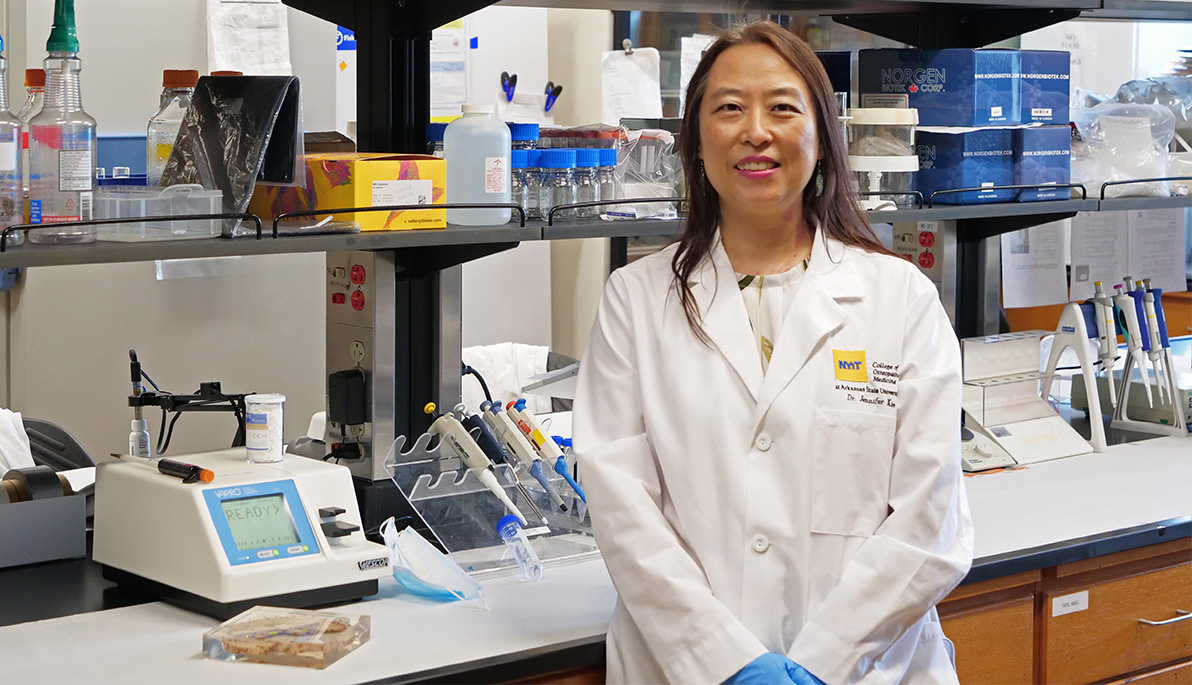
Faculty Profile: Jennifer Yanhua Xie

Title: Associate Professor
Department: Biomedical Sciences
Joined New York Tech: 2017
Campus: Jonesboro
Advancing Biomedical Research
In 2020, Jennifer Yanhua Xie, Ph.D., associate professor of basic sciences, secured NYITCOM-Arkansas’s first grant from the National Institutes of Health (NIH). Now she is partnering with a biomedical researcher from Arkansas State University (A-State) on yet another NIH-funded project, which aims to develop a new, more cost-effective treatment for inflammatory bowel disease (IBD), an autoimmune disease impacting approximately seven million people worldwide. The project is the first NIH-funded research collaboration between NYITCOM-Arkansas and A-State.
The Box sat down with Xie to learn more about her current research projects and her advice for aspiring biomedical scientists.
How did you become interested in biomedical research?
When I was a college student, one of the professors mentioned that among all the scientific fields, medicine develops at the slowest pace because biomedical research is much harder to perform, especially research related to the human brain. This perked high interest in me to explore human neuroscience for the rest of my life. To make it more exciting, the 1990s were designated as “Decade of the Brain” by President George H.W. Bush.
Thus, ever since I started my graduate study at the University of Arizona, my research focus has been neuroscience, specifically chronic pain. “Pain” is the number one reason for patients to seek medical help. Although opioids have a strong addictive propensity and high fatality rate from an overdose, they are still the mainstay of pain relief for decades. To better help patients, we have to find better alternatives. Given this, my research has been focusing on seeking new, non-opioid compounds with fewer side effects as well as non-pharmacological treatments to help patients with a variety of pain conditions.
Since 2020, you’ve been involved in two NIH-funded research projects. What can you tell us about these studies?
I have received two NIH R15 grants so far. One as the primary investigator (PI), the other as co-PI.
The first project, for which I am the PI, aims to explain how osteopathic manipulative treatment (OMT) may help to alleviate migraine pain. Clinical experience suggests that OMT can reduce the frequency and intensity of migraine episodes, and this has also been suggested by animal models. However, the exact mechanisms that provide these therapeutic benefits are not yet understood, preventing OMT from being used as a widespread treatment for migraines. Involving the expertise of my NYITCOM-Arkansas colleague Regina Fleming, D.O., assistant professor and chair of the Department of Osteopathic Manipulative Medicine (OMM), as well as the help of our medical students, my project explores how OMT can alleviate migraines in rats.
The second NIH R15 grant is in collaboration with Jianfeng (Jay) Xu, Ph.D., assistant professor in the College of Agriculture and Technology at A-State, titled “Engineering novel designer biologics in plant cells for oral treatment of ulcerative colitis.” This project aims to develop a new class of low-cost and effective plant cell-produced oral biologic drugs to treat IBD, an autoimmune inflammatory disease of the gastrointestinal tract system that affects seven million people worldwide. Dr. Xu is the PI and is creating biologics from plant cells that can withstand the stomach’s acidic conditions so that they can be taken orally and exert their effects at the gut to treat IBD. I will contribute my expertise related to pharmacology and animal studies. It is the first NIH award obtained by the joint effort of NYITCOM-Arkansas and A-State, showcasing the fruit of our collaborations with complementary expertise.
What excites you most about these projects?
Our OMT and migraine research project is the very first one that the NIH has supported to provide evidence for the efficacy of OMT and its mechanisms. The second project is the first collaborative project between NYITCOM and A-State that has received an extramural award. Both projects aim to provide evidence-based strategies to treat difficult conditions from brand new angles and, thus, are very exciting. Their success highlights the importance of collaboration between different fields. For the OMT project, I am collaborating with our OMM chair, Dr. Fleming, who is essential to determining how to translate the human osteopathic manipulative medicine techniques to rats. The IBD project requires Dr. Xu’s expertise to produce plant-based biologics. The success of this new platform will open the door to produce other biologics in a much more efficient and economical way using plants.
The relationship between NYITCOM and A-State creates some unique opportunities for the faculty and staff of both institutions. How have you and your students benefited from that?
The partnership between NYITCOM and A-State is vital to my research. My lab space is provided by A-State and the Arkansas Biosciences Institute (ABI), including the animal facilities and institutional support (e.g., Institutional Animal Care and Use Committee, IACUC) that is instrumental for my research projects.
The ABI and A-State make the completion of my research projects possible and have provided crucial support in the form of lab space and equipment, as well as support for my A-State Ph.D. student, Mr. Krishna Sharma, via the molecular and biosciences program. He has been instrumental in setting up my laboratory, working collaboratively with the medical students, training and supervising the undergraduate students, and propelling multiple projects forward. His commitment and dedication are critical for the daily function of my laboratory. In addition to Krishna, the great team in my lab also includes four medical students and two M.S. students from NYITCOM, as well as four undergraduate A-State students.
I am also collaborating with A-State faculty Guo-Lei (Jason) Zhou, Ph.D., professor of cell biology, and Dr. Jay Xu, the PI for the NIH-funded IBD project mentioned earlier, to publish manuscripts, submit grant applications, and train graduate and undergraduate students together. In addition to working with Dr. Xu on the NIH-funded research project, I have published a manuscript with Dr. Zhou in the journal Molecular and Cellular Biology.
All of these efforts benefit NYITCOM students. Student feedback on their research experiences in my laboratory has been overwhelmingly positive, greatly helping them to better prepare for their future careers and helping them to gain a hands-on understanding of scientific aspects that cannot be learned in the classroom or from textbooks. Students also develop professional skills in time management and planning, critical thinking, working closely with others as a team, effective communication, and other career development benefits.
What aspect of your job do you most enjoy?
I love the collaborative atmosphere at our medical school and between NYITCOM and A-State. All of the students, faculty, staff, and administrative leadership are extremely friendly and supportive. Working with them makes the difficult academic life super productive and enjoyable! I am very lucky that what I do for a living is exactly what I enjoy doing every day.
What advice do you have for aspiring biomedical researchers?
I like two clichés: “Follow your heart and be persistent” and “Try your best and accept the results.” Although failure and frustrations are commonly accompanying biomedical research, pursuing new research ideas as they develop is also highly rewarding. It takes years of hard work and dedication to achieve visible accomplishment.
In addition, modern biomedical research is getting more and more complex. It takes a village to obtain breakthroughs. Building an interdisciplinary team is essential to brainstorm new ideas and provide complementary expertise. The success of my NIH grants is a great testimony of this strategy.
This interview has been edited.









